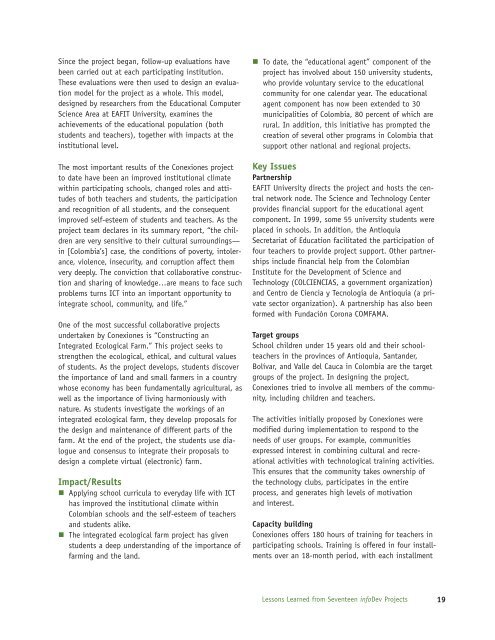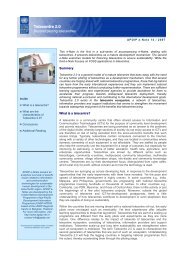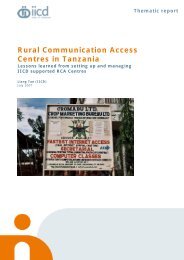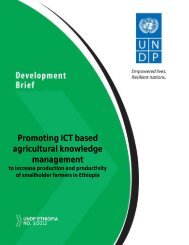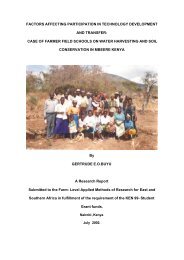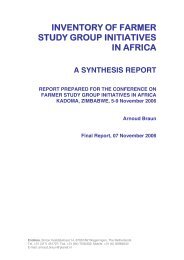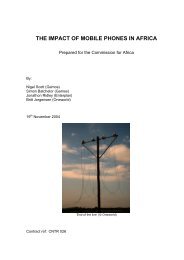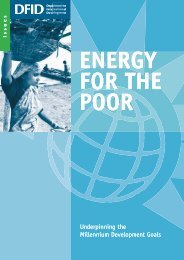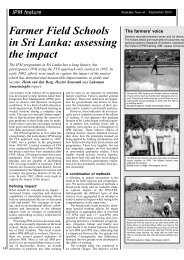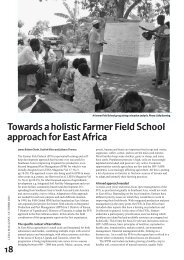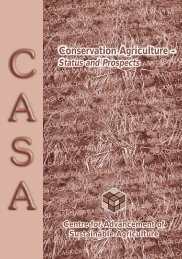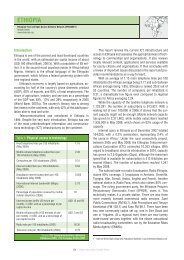ICT for Development - infoDev
ICT for Development - infoDev
ICT for Development - infoDev
Create successful ePaper yourself
Turn your PDF publications into a flip-book with our unique Google optimized e-Paper software.
Since the project began, follow-up evaluations have<br />
been carried out at each participating institution.<br />
These evaluations were then used to design an evaluation<br />
model <strong>for</strong> the project as a whole. This model,<br />
designed by researchers from the Educational Computer<br />
Science Area at EAFIT University, examines the<br />
achievements of the educational population (both<br />
students and teachers), together with impacts at the<br />
institutional level.<br />
The most important results of the Conexiones project<br />
to date have been an improved institutional climate<br />
within participating schools, changed roles and attitudes<br />
of both teachers and students, the participation<br />
and recognition of all students, and the consequent<br />
improved self-esteem of students and teachers. As the<br />
project team declares in its summary report, “the children<br />
are very sensitive to their cultural surroundings—<br />
in [Colombia’s] case, the conditions of poverty, intolerance,<br />
violence, insecurity, and corruption affect them<br />
very deeply. The conviction that collaborative construction<br />
and sharing of knowledge…are means to face such<br />
problems turns <strong>ICT</strong> into an important opportunity to<br />
integrate school, community, and life.”<br />
One of the most successful collaborative projects<br />
undertaken by Conexiones is “Constructing an<br />
Integrated Ecological Farm.” This project seeks to<br />
strengthen the ecological, ethical, and cultural values<br />
of students. As the project develops, students discover<br />
the importance of land and small farmers in a country<br />
whose economy has been fundamentally agricultural, as<br />
well as the importance of living harmoniously with<br />
nature. As students investigate the workings of an<br />
integrated ecological farm, they develop proposals <strong>for</strong><br />
the design and maintenance of different parts of the<br />
farm. At the end of the project, the students use dialogue<br />
and consensus to integrate their proposals to<br />
design a complete virtual (electronic) farm.<br />
Impact/Results<br />
Applying school curricula to everyday life with <strong>ICT</strong><br />
has improved the institutional climate within<br />
Colombian schools and the self-esteem of teachers<br />
and students alike.<br />
The integrated ecological farm project has given<br />
students a deep understanding of the importance of<br />
farming and the land.<br />
To date, the “educational agent” component of the<br />
project has involved about 150 university students,<br />
who provide voluntary service to the educational<br />
community <strong>for</strong> one calendar year. The educational<br />
agent component has now been extended to 30<br />
municipalities of Colombia, 80 percent of which are<br />
rural. In addition, this initiative has prompted the<br />
creation of several other programs in Colombia that<br />
support other national and regional projects.<br />
Key Issues<br />
Partnership<br />
EAFIT University directs the project and hosts the central<br />
network node. The Science and Technology Center<br />
provides financial support <strong>for</strong> the educational agent<br />
component. In 1999, some 55 university students were<br />
placed in schools. In addition, the Antioquia<br />
Secretariat of Education facilitated the participation of<br />
four teachers to provide project support. Other partnerships<br />
include financial help from the Colombian<br />
Institute <strong>for</strong> the <strong>Development</strong> of Science and<br />
Technology (COLCIENCIAS, a government organization)<br />
and Centro de Ciencia y Tecnologia de Antioquia (a private<br />
sector organization). A partnership has also been<br />
<strong>for</strong>med with Fundación Corona COMFAMA.<br />
Target groups<br />
School children under 15 years old and their schoolteachers<br />
in the provinces of Antioquia, Santander,<br />
Bolívar, and Valle del Cauca in Colombia are the target<br />
groups of the project. In designing the project,<br />
Conexiones tried to involve all members of the community,<br />
including children and teachers.<br />
The activities initially proposed by Conexiones were<br />
modified during implementation to respond to the<br />
needs of user groups. For example, communities<br />
expressed interest in combining cultural and recreational<br />
activities with technological training activities.<br />
This ensures that the community takes ownership of<br />
the technology clubs, participates in the entire<br />
process, and generates high levels of motivation<br />
and interest.<br />
Capacity building<br />
Conexiones offers 180 hours of training <strong>for</strong> teachers in<br />
participating schools. Training is offered in four installments<br />
over an 18-month period, with each installment<br />
Lessons Learned from Seventeen <strong>infoDev</strong> Projects<br />
19


